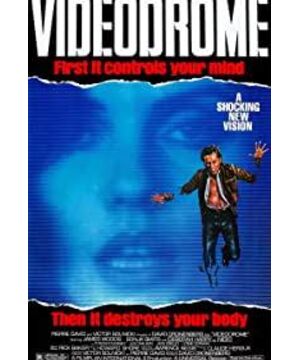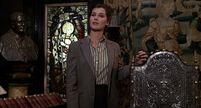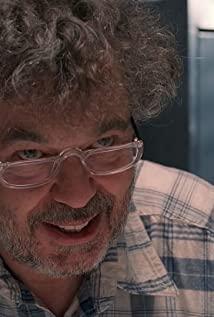In "Videotape Murder", Cronenberg used grotesque images to highlight a metaphorical story. The tragedy of a TV person who was hallucinated by watching a SM video tape and was eventually controlled by the TV until he committed suicide.
The whole movie has made a lot of visual effort. In addition to the dark atmosphere, the smooth and calm movement of the mirror, a lot of symbolism is used-such as a video tape that can eat people or a TV that appears all the time. In movies, TV sets have become a kind of horror imagery, just like the status of mirrors in many horror movies. When they see the black hole video screen, many viewers will feel nervous, because you don’t know what will appear next. What will it be. It is worth mentioning that there are often scenes of TV personality Marx's sexy girlfriend seducing him on TV. Just as a successful politician never uses actual merits to bring happiness to the people, but uses temptation conditions to drive the emotions of voters at the moment of a general election, so TV uses a variety of ways to march into the real world. The temptation to achieve the purpose of brainwashing.
Many people hate David Cronenberg's movies because his themes are often the darkest and least contacted places in human nature. There are also many people who like his movies only because of his bold image style, for the same reason as above. Cronenberg's films are a mixture of violence and sadomasochism. The constant metamorphosis in "Naked Lunch" shows that all horrors are born from alienated human nature. The scientist who turned into a mixture of flies in "Man Flies" is the most famous and most obvious-high-tech is a terrible double-edged sword. "Crash" is my favorite one. It can be said to be an enlargement of the theme of "abuse" in the "Videotape", so I won't mention it here.
Now you can find that no matter what kind of perversion in Cronenberg's movies, it will not break away from the background of contemporary society. This is an industrialized and mechanized society. In such an era, how can we ensure that the fragile and tempted body is not mechanized. The alienated human nature and the bottom line of human taboos are the themes portrayed by the director.
There is a very absurd scene in "Videotape", that is, there is a clinic on the ground floor of the doctor's house, and that clinic is actually treated by letting patients watch TV. And the most classic argument in the whole film is in the video tape recorded by the doctor (the irony is that truth is also spread by video). The screen is part of the brain structure. Therefore, no matter what appears on the TV screen, it is for the public. Original experience. Therefore, television is reality, and reality is not as good as television. As a result, television has gradually become a tool for publicity and brainwashing. Looking back at our current era, the sound of TV is so consistent! And this is an era that loves television so much. This is bound to affect independent thinking more or less. The audience does not read, do not touch life, and do not think. The saddest ending is to become a tragic figure like Marx. The last scene of the film is quite tragic. The protagonist slowly raised the gun after seeing himself swallowing his gun and killing himself on the TV, and then banged, the screen went black, and it was over. Here, death becomes the only way of liberation. But the protagonist's subjectivity has collapsed, and he chose to die under the order of the brainwasher, and the most important reason is that he has no use value for a long time.
There is a short story by Haruki Murakami that is the same time as "Videotape", called "TV Man", which talks about the TV man's forcible invasion of the protagonist's original quiet life, causing everything in life to be messed up. Compared with "Videotape", the two have the same effect and the same effect. It is only due to the environment and personality of Murakami. The description is pessimistic but not lacking in humor. It is locked in the process of a "sensible person" losing his ego.
"Videotape Murder" was filmed in 1983, an era when television was popular in Europe and America. In the eyes of us Chinese, it is indeed an ultimate fable for contemporary society. But now, we are facing an era of cyber people. Compared with the scale of TV, the Internet has fallen into a lot of people who don't buy or watch TV. Fortunately, as a simulation world, there are always places where you can rest a bit in the network.
View more about Videodrome reviews











